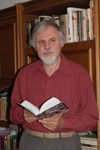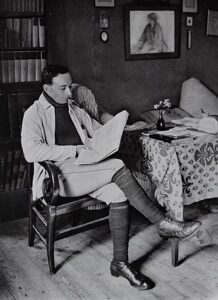By Alex Gordon


HAIFA, Israel — French writer Jean-Richard Bloch (1884-1947) was born into the assimilated family of a railway engineer. His Jewish consciousness was awakened in him as a child as a result of the wave of anti-Semitism generated by the Dreyfus affair. Bloch was educated at the Sorbonne and became a teacher of history and literature at the Lycée in Poitiers.
In 1905, he became a member of the French Socialist Party. Despite his socialist internationalism, he took an interest in Jewish issues. In the collection of short stories Levy (1912) (the writer’s mother Louise Levy came from Lorraine), the writer deeply penetrates Jewish psychology. He shows the struggle of a small Jewish community for integration in the midst of the Dreyfus affair.
In 1914 he was mobilized for military service, in which he stayed all the years of the First World War, where he was wounded three times. Ilya Ehrenburg, a Soviet writer of Jewish origin who lived in France for a long time, was well acquainted with his French colleague. Ehrenburg recalled, “Jean-Richard Bloch was one of the purest people I met in my life.”
Ehrenburg wrote about an important theme for him and his hero – the attitude to war. He quoted the correspondence of the French writer with his colleague Romain Rolland, in which both expressed their attitude to the First World War: “Jean-Richard was thirty years old in 1914, he was immediately drafted, he was wounded three times. Romain Rolland was eighteen years older, was in Geneva and wrote articles Above the fray. In the first months of the war, Romain Rolland wrote to his younger friend that he did not want to indiscriminately accuse all Germans, that he valued the spiritual unity of Europe, that it would be best if the war ended in a draw. Jean-Richard in his letters talked about the atrocities of the Germans, their savagery, believed that this is the last war – it is worth to defeat the Kaiser’s Germany, as peace, freedom, happiness will triumph.”
It follows from Ehrenburg’s narrative that both French writers poorly understood the dimensions of the tragedy that had a continuation in the Second World War, where the murderous game of victory over the Germans in the first part, in the First World War, was “finished.” “The “spiritual unity” of Europe, the “draw” in the war, the “last war,” the “triumph of peace, freedom and happiness” were the imaginary values with which European leftist intellectuals operated.
Bloch accepted the Bolshevik revolution of October 1917 and became a member of the French Communist Party (1921), but showed great doubts about the need for the dictatorship of the proletariat. The Jewish theme continued to interest and excite him. In his novel … and Company (1917), Bloch depicted the conflicts faced by a Jew who wishes to preserve his inner world within the framework of French culture. The writer visited Mandate Palestine and took part in the opening ceremony of the Hebrew University in Jerusalem in 1925. Thereafter he wrote a number of articles on the future role of the Jewish people, notably an article with the rousing title “What benefit can the Jews bring to the world?” (1927). An essay entitled “The Fate of the Century” (1931) showed that his approach to the Jewish problem became somewhat ambiguous.
In 1934, the first congress of Soviet writers was held in Moscow, which was attended by Jean-Richard and Ilya Ehrenburg, who came from France. The congress was held in the Column Hall of the Kremlin from August 17 to September 1. It was attended by 591 delegates and more than 40 foreign guests. When Ehrenburg explained to French writers in Paris that the dictatorship in the Soviet Union was a temporary necessity, he may have believed it himself.
In Moscow, during the congress, he realized that his French friends were disappointed and even shocked by the narrow-mindedness of the Bolshevik leaders. Jean-Richard Bloch, losing patience, almost shouted to the high-ranking Bolshevik publicist Karl Radek, a Jew, from the rostrum of the Moscow Congress: “I warn you that if you persist in condemning individual freedom, you will push the broadest masses in the West toward fascism. Is that what you want?” 182 congress participants died over the next few years in prisons and gulags. Another 38 were repressed but survived. Jews Isaac Babel and Mikhail Koltsov (Moses Friedland, described by Hemingway in For Whom the Bell Tolls as Soviet agent Karkov) and Russian Boris Pilnyak, who traveled frequently and lived abroad for long periods of time, were convicted of espionage and shot.
In 1941, fearing expulsion to a Nazi death camp under the French administration’s anti-Jewish law, Bloch fled to Moscow, where he participated in radio broadcasts to France. He lived in the Soviet Union from the summer of 1941 until the winter of 1944. He appeared weekly on radio and produced more than 1,200 radio features
Bloch experienced antisemitism in the USSR as well. Ehrenburg told about it in his memoirs: “When in one editorial office he heard talk that ‘the Jews prefer the front to Tashkent (i.e., are in the rear.- A. G.)’, he calmly replied that during the Dreyfus trial he had already heard such talk and in the lyceum hit future fascists in the face for them. Bloch argued that a Jew should be “Eastern in the West and Western in the East.” According to Bloch, the Jew could help unite different groups of people in the direction of universalism, leading to peace. This image of the Jew coincided with the writer’s belief in socialism and communism.
In 1945 Bloch returned to France, escaping Soviet charges of espionage. There he and his wife Marguerite, sister of the Jewish writer André Maurois, learned that their daughter France Bloch-Sérazin, a member of the Resistance Movement, has been beheaded by the Nazis in Hamburg, and the writer’s 86-year-old mother Louise had been murdered in a gas chamber at Auschwitz on June 4, 1944.
*
Alex Gordon is professor emeritus of physics at the University of Haifa and at Oranim, the academic college of education, and the author of 10 books.